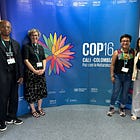The COP 16 Outcome That Matters
Despite the incremental nature of COP 16 negotiations clashing with the urgent reality of biodiversity loss, there is one outcome from the meeting that matters for today and tomorrow.

I’ve been grappling with a cognitive dissonance I experienced at the UN Biodiversity COP 16 in Colombia. As a friend wrote to me in response to Tuesday’s reflection,
Biodiversity COP 16's goal of protecting 30% of the remaining wildlife, even if achieved, won't be enough. The World Wildlife Fund has reported a "catastrophic 73% decline in global wildlife populations" since 1970, which has made the web of life extremely fragile.
She is correct. The dissonance I was experiencing was about the urgent need to take radical action to protect what is left of the Earth’s biodiversity and stave off further species extinction, including our own, and the incremental nature of COP 16 (and all of the other UN meetings on both climate change and biodiversity loss). I’ve been struggling this week to reflect theologically on the outcomes of the conference in Colombia because what I was witnessing at the high level of negotiations was a business-as-usual model operating within the same structures of capitalism and colonialism that have brought us to the precipice of planetary devastation.
“We are beginning the era of human extinction. I do not think I am exaggerating.” - Colombian President Gustavo Petro
We are in a climate and ecological crisis, and it’s all hands on deck... Subscribe to join a community of people of faith who care about climate action and find hope and encouragement at the same time!
Yet.
Yet, there is one significant outcome from COP 16 that I witnessed last week. There is one outcome that matters, whether the changes we make are transformative, as they need to be, or incremental (and insufficient), as they are shaping out to be.
After many hours of negotiation, and in the last hours of the meeting, a permanent Subsidiary Body was approved to ensure that Article 8j regarding the rights and contributions of Indigenous peoples and local communities (IPLCs)1 be integral to the Convention on Biological Diversity and the implementation of the GBF. Article 8j reads:
Each contracting Party shall, as far as possible and as appropriate: Subject to national legislation, respect, preserve and maintain knowledge, innovations and practices of indigenous and local communities embodying traditional lifestyles relevant for the conservation and sustainable use of biological diversity and promote their wider application with the approval and involvement of the holders of such knowledge, innovations and practices and encourage the equitable sharing of the benefits arising from the utilization of such knowledge innovations and practices.
There had been a temporary Subsidiary Body ensuring the consultation and participation of IPLCs up to this point. The fact that it is now permanent is a historic decision that was hard-won after eight years of advocacy. It means that IPLCs will work alongside nation-states toward achieving the goals for biodiversity protection set out in the Kunming Global Biodiversity Framework (GBF) that was adopted at COP 15 in Montreal, Quebec in 2022. It means that the program of work arising from Article 8j will “make Indigenous-led initiatives central to global biodiversity efforts.” As Bryan Bixcul (Maya-Tz'utujil), Global Coordinator of the Securing Indigenous Peoples’ Rights in the Green Economy (SIRGE) Coalition writes:
Key objectives [of Article 8j] include conserving and restoring Indigenous lands, promoting sustainable practices, and ensuring fair benefit-sharing from the use of genetic resources. The program emphasizes protecting traditional knowledge, integrating it with scientific approaches, and upholding Indigenous rights. Additionally, it seeks to enhance direct funding access for Indigenous communities, empowering them to lead conservation and sustainable land management.
This is a truly historic decision! The room of negotiators and delegates observing the process burst into applause and cheers after the gavel came down. It was a decision that suggests there is a paradigm shift in recognition and power-sharing with respect to the Earth’s biodiversity and the leadership role of IPLCs in caring for the Earth community.
While there were other decisions made at COP 16, such as on the benefit-sharing of digital sequence information on genetic material, to me the establishment of a permanent Subsidiary Body that recognizes the important role of Indigenous people and local communities in caring for the Earth is the one decision that matters. It is a decision that defies the realities of capitalism and colonialism that are present at COP 16 and other COPs. It is a decision that will make an impact, for IPLCs and the Earth community, regardless of how incrementally the negotiations at this and future COPs move.
The establishment of a permanent Subsidiary Body on Article 8j defies the realities of capitalism and colonialism that are present at COP 16 and other COPs. It is the one decision at COP 16 that matters.
My reflection earlier this week on the relationship between the ‘grass stalks’ of the high-level negotiations and the ‘grassroots’ of communities and civil organizations was influenced by the presence and power of the grassroots all around me at COP 16. In particular, Indigenous people and local communities were represented; wearing the clothing and headdresses that mark their unique identities, the presence of Indigenous communities among the government representatives (dressed in suits and other markers of power and establishment) they tangibly demonstrated their will and authority to lead in the realm of biodiversity protection.
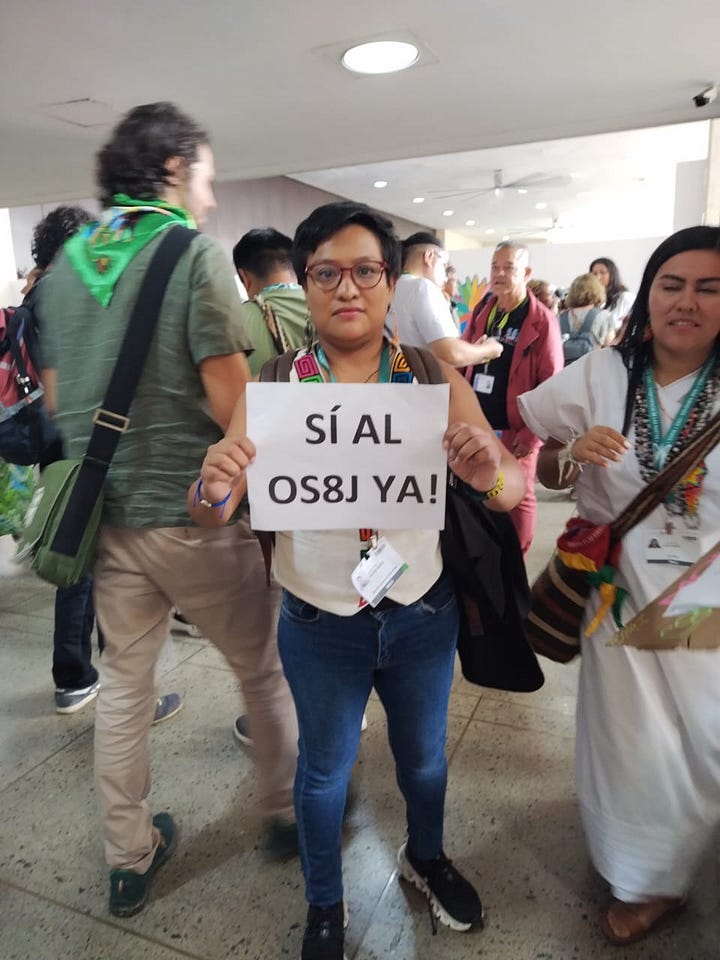
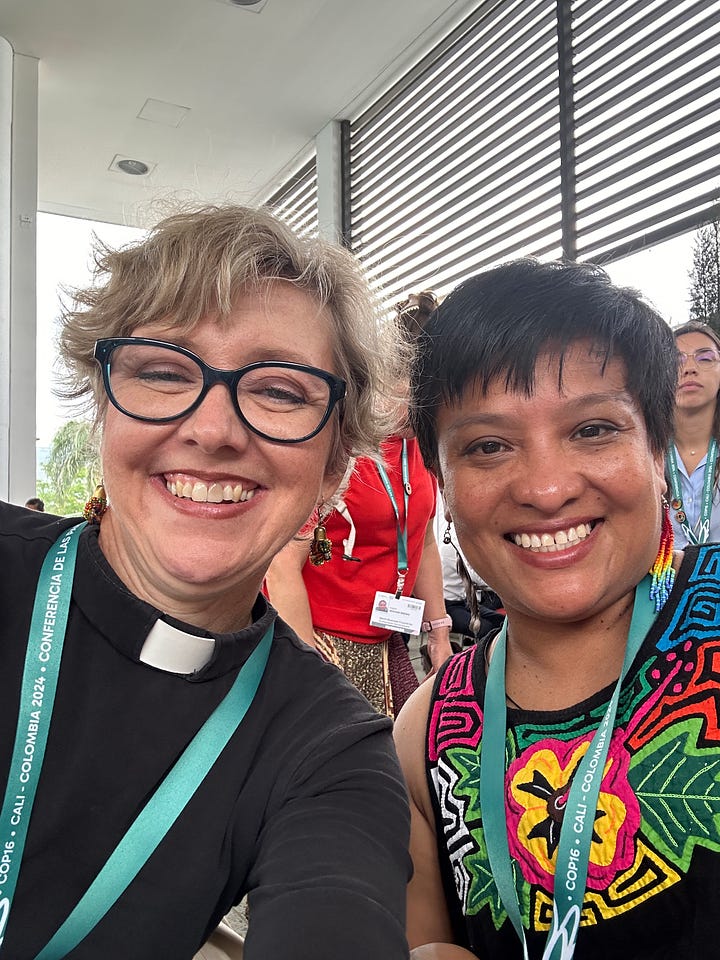
This is Jocabed Solano, an Indigenous woman from the Gunadule Indigenous nation in Panama. She is the Director of Indigenous Memory and was part of the WCC delegation to COP 16.
COP 16 has been hailed as the “peoples’ COP,” with an unprecedented turnout of nearly 23,000 delegates to the formal portion of the conference, and thousands more attending the educational “Green Zone” that was open to the public. This is the work of the Holy Spirit, who moves through the grassroots, empowering those whose voices have been ignored, such as Indigenous voices, and opening the ears and hearts of those who have held onto power for so long.
The cognitive dissonance that I experienced at COP 16 remains; there is too much work to do and too little time for the slow mechanism of UN COPs to be sufficient. However, the decision at COP 16 to enshrine the leadership of IPLCs through the Subsidiary Body of Article 8j has implications for today and tomorrow as we work together to prevent the worst of species extinction and protect what is left of Earth’s biodiversity. This is the decision at COP 16 that matters. Thanks be to God.
This post is free for all subscribers. If you’d like the full range of inspiration and encouragement in your journey of faith-based climate action, consider upgrading to a paid subscription!
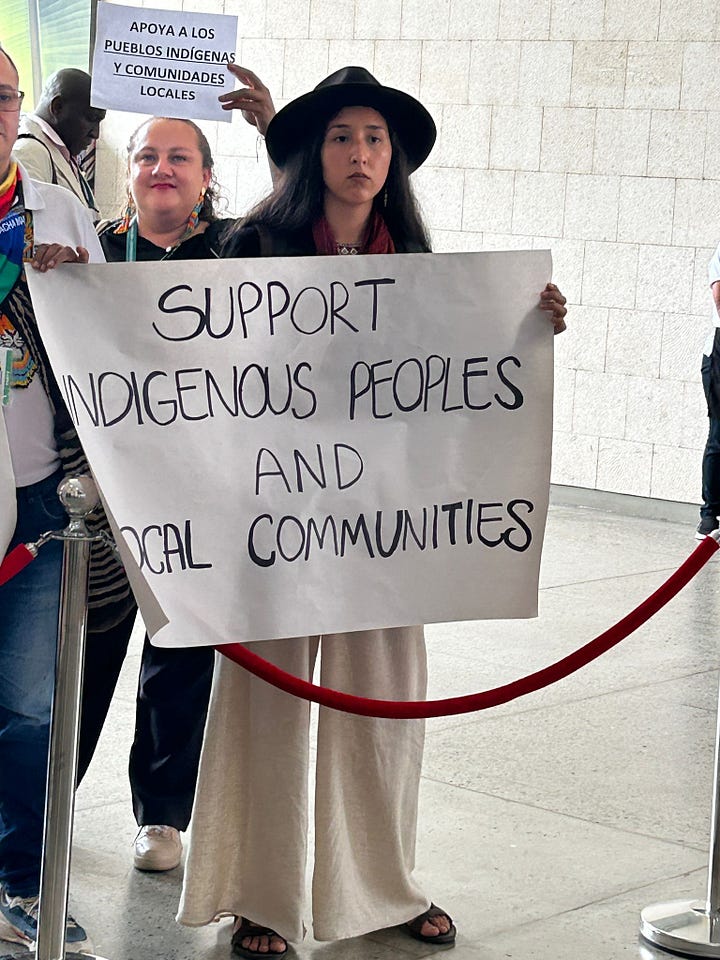
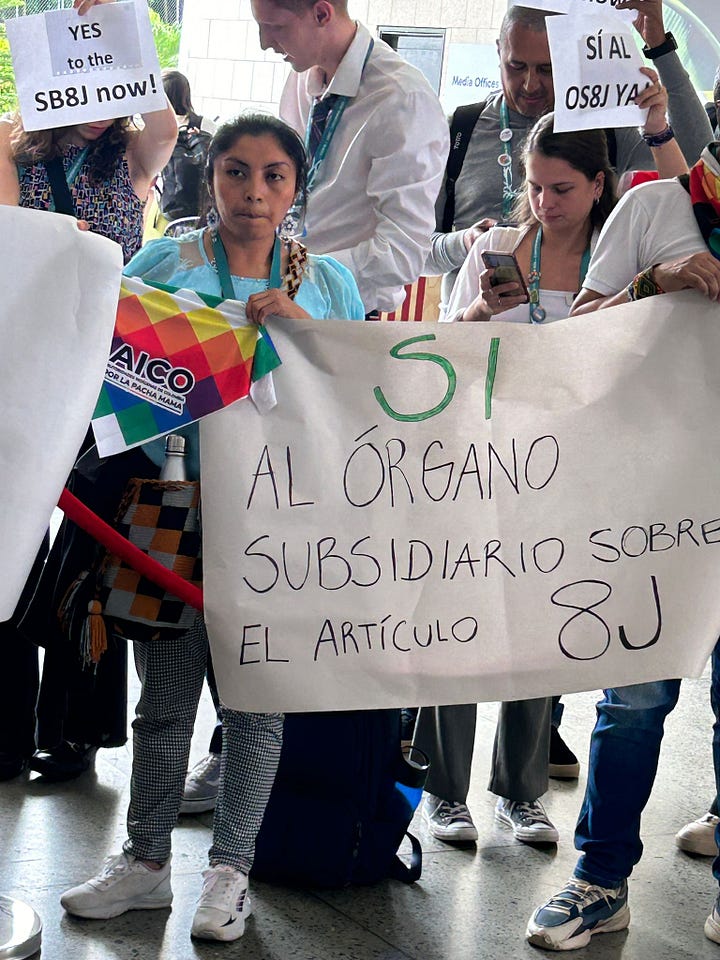
This is the specific phrase used by the UN. “The term ‘Indigenous Peoples and local communities’ and its acronym ‘IPLC’ are widely used by international organizations and conventions to refer to individuals and groups who self-identify as indigenous or as members of distinct local communities. We adopt this terminology in this assessment, with particular emphasis on those who ‘maintain an inter-generational historical connection to place and nature through livelihoods, cultural identity, languages, worldviews, institutions, and ecological knowledge’.






